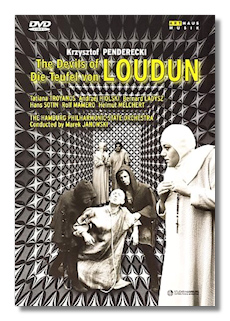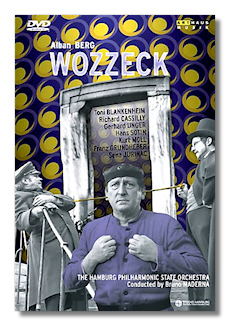
The Internet's Premier Classical Music Source
Related Links
-
Berg Reviews
Penderecki Reviews - Latest Reviews
- More Reviews
-
By Composer
-
Collections
DVD & Blu-ray
Books
Concert Reviews
Articles/Interviews
Software
Audio
Search Amazon
Recommended Links
Site News
 DVD Review
DVD Review
20th-Century Opera

Krzysztof Penderecki
Die teufel von Loudun (The Devils of Loudun)
- Tatiana Troyanos (Jeanne)
- Andrzej Hiolski (Urbain Grandier)
- Bernard Ladysz (Father Barré)
- Hans Sotin (Father Rangier)
- Karl-Heinz Gerdesmann (Jean d'Armagnac)
- Rolf Mamero (Guilleaume de Cerisay)
- Kurt Marschner (Adam)
- Heinz Blankenburg (Mannoury)
Chorus of the Hamburg State Opera
Hamburg Philharmonic State Orchestra/Marek Janowski
Arthaus Musik DVD 101279 108 minutes Full Screen Dolby Digital 1.0


Alban Berg
Wozzeck
- Toni Blankenheim (Wozzeck)
- Sena Jurinac (Marie)
- Gerhard Unger (Captain)
- Hans Sotin (Doctor)
- Peter Haage (Andres)
- Richard Cassilly (Drum Major)
- Kurt Moll, Franz Grundheber (Workmen)
Chorus of the Hamburg State Opera
Hamburg Philharmonic State Orchestra/Bruno Maderna
Arthaus Musik DVD 101277 106 minutes Full Screen Dolby Digital 1.0
Both of these landmark 20th-century operas are based on actual events. In 1634, a Catholic priest named Urbain Grandier was tortured and burned at the stake in the French town of Loudun for a supposed allegiance with the devil, although the motivation for his murder seems to have been primarily political. In 1821, a barber named Johann Christian Woyzeck, later supposed to be mad, murdered his lover in Leipzig. Both of these incidents were adapted into literary works (by Aldous Huxley and Georg Büchner, respectively) whose artistic value transcends the lurid tone of the source material. Both, of course, became operas. Berg's Wozzeck (1921) remains more or less in the repertoire, although it is difficult to do well, and is not pleasing to the proverbial tired businessman. Penderecki's Die Teufel von Loudun (1969) is a rarer vintage. It has had relatively few productions and only one commercial recording since its première, and the appearance of a filmed-for-television version of the complete opera is as surprising to me as it is welcome. In many ways, this is a difficult work too, not least because of its cynicism, as well as its eerie music, in which the glissando and the sustained tone cluster reign supreme.
Both productions are from the Hamburg State Opera, which around this time participated in several productions for television, thanks to the vision of artistic director Rolf Liebermann. Instead of simply broadcasting or filming an actual stage performance, Liebermann, working with director Joachim Hess, rethought the works – "opened them up," if you will – to make them more viable for viewing at home. Although the results show their age, these films remain convincing not just as films, per se, but as musically and theatrically faithful representations of the two operas.
The Devils of Loudun was filmed a month after the opera's première, with much the same cast. Although the atmosphere is suffocating, claustrophobic, and almost completely lacking in daylight, not once does one feel that the action is taking place on an operatic stage. (It seems that we are in hell already.) Stage director Konrad Swinarski attempted to give the opera a period feel, and to make it as realistic as possible, and those attributes have been retained by Hess, down to the brutal scenes in which Father Grandier is tortured. The viewer is spared little. Hess, however, imaginatively uses visual effects to make a dramatic point – for example, the superimposition of the hunchbacked Prioress Jeanne's lascivious fantasies about Grandier over a full-screen image of her face.
Both musically and dramatically, this is a fearless performance, one that is unlikely to be surpassed. At the center of it are Andrzej Hiolski's Grandier and Tatiana Troyanos's Jeanne. Penderecki eschews melodies in favor of pitched declamation, and so for this opera to work, the singers need to act not only with their bodies and faces, but also with their voices. Hiolski and Troyanos immerse themselves in their tasks with uncompromising intensity. Hiolski's striking baritone voice projects Grandier's human weaknesses as well as the underlying strength and integrity of his character. As for Troyanos, seeing and hearing her performance is like being in the presence of someone who is wound so tightly that all her parts might fly apart at any moment.
This opera has a large cast, and it is difficult to praise one or two of its members without praising all. Still, it would be unfortunate not to mention Kurt Marschner and Heinz Blankenburg, Loudun's scheming chemist and surgeon, respectively, whose pettiness gets the action moving. Marschner, in particular, seems to have been quite the comedian, and he and Blankenburg provide welcome comic relief, even if it is comedy of the very blackest type. Near the end of the opera, when the pair is ordered to shave Grandier's head and pull out his fingernails, Marschner's and Blankenburg's frozen panic is a memorable moment. Helmut Melchert depicts politics at its most oily and sinister in the role of the Baron de Laubardement, the King's commissioner. Another memorable portrayal comes from Ernst Wiemann as Father Ambrose, the only man who shows compassion to Grandier during his final hours.
The production of Wozzeck comes from the following year, in 1970. In contrast to The Devils of Loudun, much of it was filmed outdoors, in and around the grounds of an old German castle. Said castle is somewhat worse for wear, and it turns out to have been a surprisingly appropriate and atmospheric setting. Hess's eye for composition is superb, at times seemingly influenced by the German Expressionist directors. The cameras pull one into the drama in a way more difficult to achieve in the opera house, and the direction itself thankfully lacks the ironic distancing all too common in productions from the last two decades. There are orchestral interludes between the scenes, some of them quite lengthy, and here, a decision was made to keep the cameras rolling, and to show us the characters in action. (Also, as in The Devils of Loudun, there are no breaks between the acts.)
Conductor Bruno Maderna was one of the gods of 20th-century music, and his Wozzeck is deeply emotional, so much so that even listeners who usually find themselves resisting Berg's music might be compelled to go along for the ride anyway. In my experience, the only other conductor to lead this music so feelingly was Karl Böhm.
Toni Blankenheim falls a little short of greatness in the title role. Both visually and vocally, his Wozzeck is more stolid than stressed, and several singers come to mind who express a greater range of emotions, painted with a broader palette of colors, than Blankenheim does. The camera is cruelly perceptive, though, and it is possible that Blankenheim thought (or was told) that he needed to scale things back for television. His voice is a little frayed too, although I suppose that fits the character.
Sotin is chilling as the Doctor, almost a character out of a Fassbinder film. His eyes are all aglitter as he torments both Wozzeck and the Captain. In the latter role, Unger seems to be modeling himself after Gerhard Stolze, with ample use of a grotesque falsetto. Cassilly's strutting Drum Major is so well sung one wonders what he would have been like in the larger role of the Captain. Haage is a likeable Andres, and it is luxury casting to find Moll and Grundheber as the drunken workmen, who appear briefly in one scene and then disappear. The real surprise here is Sena Jurinac as Marie. Here is a singer who was most famous for her Mozart roles. Berg is a very different challenge, of course, and yet she brings her familiar virtues to Marie as well: warmth, vibrancy, and dedication to the score's musical values. She is a fine actress too.
Arthaus Musik's boxes might cause one to believe that these productions are in black in white. Fortunately, they are in color, and the visuals (full screen) still look quite good, even though there are enough artifacts to remind us that we are watching films that are almost 40 years old. (At the start of Wozzeck there is a brief statement that there were film elements that could not be completely restored, but the apology was hardly necessary.)
There are several staged productions of Wozzeck on DVD, and viewers might want to explore one of those first. Although it is not for everyone, The Devils of Loudun is one-of-a-kind, and therefore the second DVD should not be ignored.
Copyright © 2007, Raymond Tuttle




















